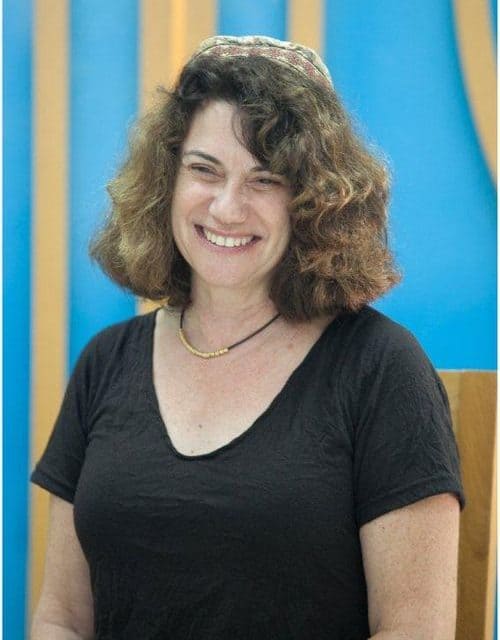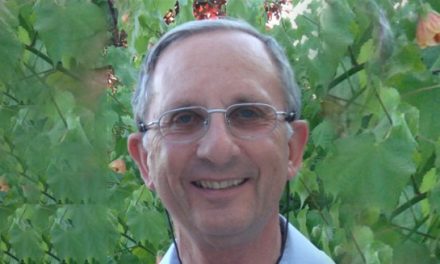By Ruth Thomas…
Rabbi Kinneret Shiryon [pictured above] has left an enduring impression on the Temple Sinai community.
Maspiah of Temple Sinai Rabbi Jo Ellen Duckor summed it up in a few words. “ It was inspirational and wonderful to have her with us for the High Holydays,” she said.
Rabbi Kinneret was also deeply impressed. When asked the highlight of her stay in Wellington, she said it was the commitment of Temple Sinai members to Jewish learning and Jewish communal life that made it memorable.
“Far from the major pockets of Judaism, Temple Sinai members take time to study the Torah together and have dedicated themselves to strengthening their Jewish identity. They have a commitment to Jewish learning and Jewish communal life that is extremely impressive.”
It is fitting her visit was at the time of celebrations of 125 years since NZ women gained the vote.
Born in New York, in 1983, she was one of the first 22 women in the world to become a rabbi and was the first woman rabbi of a congregation in Israel.
In this role, she had to overcome the prejudices of congregants who believed a woman was incapable of community leadership.
At first, she drew crowds coming to see how a woman would perform. She was interviewed many times including on a television talk show watched by 80% of the Israeli secular public.
Pregnant with her second child, she was asked by interviewer what her baal (the Hebrew word for husband) did for a living.
“He is not my baal,” she replied as the word means literally “owner” in Hebrew. The audience gasped in horror understanding she was unmarried.
“He is not my owner. I am not his property. There is no ownership in our relationship but rather a partnership,” she continued.
There was enormous spontaneous applause.
Language, she said, is a conduit of a people’s values.
“By using sexist expressions that reflect woman’s status as a chattel we maintain a derogatory attitude and pass it down to future generations.”
Today there are many native-born Israeli women rabbis and their impact is large.
“Women rabbis have sensitized Israelis not only to a more egalitarian approach in prayer but also in the gender-based Hebrew language,” she said.
They have also raised awareness among adolescent girls to marking their entrance to adulthood through a bat-mitzvah ceremony. Reform congregations in Israel encourage this but only a few take up the option in comparison with the number of young men who have a bar-mitzvah.
“Young women are stigmatized regarding their desire to read from the Torah.
“They are told menstruating women are prohibited from approaching the Torah. They are often mocked by their peers for trying to imitate the boys so they choose to celebrate by throwing a big party.”
Many Reform congregations now offer a Mothers and Daughter Bat-mitzvah Experience programme to remedy this and the results have been heart-warming, Rabbi Kinneret said.
Mothers and daughters meet in a protective environment led by a woman rabbi. The highpoint of the programme is a joint Shabbat b’not mitzvah ceremony where they feel more secure in going up to the Torah in a safe environment and are emboldened to take the next step and opt for an independent bat-mitzvah ceremony, just as young men do.
Women rabbis provide the legitimacy for all women to go up to the Torah and recite the blessings.
“For the first time in their lives, many women go up to the Torah with tears of joy and excitement as they recite the blessings.
“It is an extraordinary event that takes place weekly in Israeli Reform congregations. Older women tell me they would not have dared do so unless they had seen me chanting from the Torah.”
Along with this, women rabbis have also created ceremonies and rituals to mark various transitions in women’s lives. She describes the b’rit labat ceremonies to welcome newborn girls into the covenant, Rosh Chodesh ceremonies, ceremonies for menopausal women and for widows.
One of her favourites is the hafrashat challah (separating the challah) ceremony for marking the entrance of young women soldiers into the army. The soon-to-be soldier invites her close friends and family to an evening of baking challot. While the challot are baking, four women make a chuppah from a tallit. The soldier stands underneath it and is blessed.
Women in the rabbinate also convey a different model of leadership to their communities, she said. Rabbi Kinneret built her synagogue on the principles of empowering others, enabling, involving and sharing.
“It is a model that allows for partnership.”
Women rabbis serve as role models for other women and men. Rabbi Kinneret and her husband Baruch who was the main care-giver, raised four children while she was a communal leader. This allowed others to witness and imitate a model of parenting that is very foreign in Israeli society.
Women have also influenced change beyond the liberal religious Jewish frameworks. Orthodox women’s prayer groups have been set up across the country, there are public m’gilah readings for Orthodox women, numerous Rosh Chodesh groups, and providing front-page publicity, Women of the Wall.
“ I am proud to be part of the change that is taking place in Israeli society today. An entire generation of schoolchildren are being taught a different egalitarian Jewish set of values,” she said.






